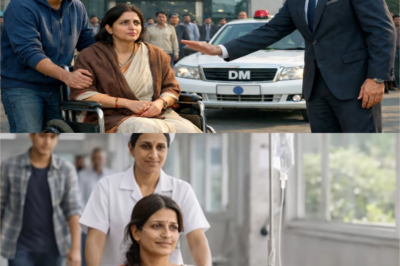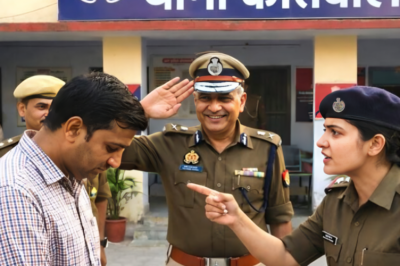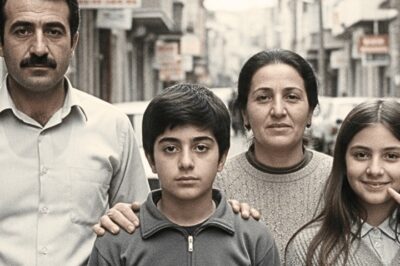Tennis Player Radhika Yadav was shot by her father
India’s sports fraternity and the wider public were left stunned and heartbroken as news broke of the untimely and shocking death of Radhika Yadav, a rising star in Indian tennis. The 25-year-old athlete, known for her determination and growing international presence, was reportedly shot dead by her own father in broad daylight at their home in Sector 57, Gurugram (Gurgaon). The incident, which unfolded between 12:00 PM and 2:00 PM, has not only shaken the world of Indian sports but also reignited discussions around domestic violence, mental health, and familial pressures on young athletes.
According to initial reports, Radhika Yadav was shot three times by her father using his licensed revolver. The police were informed by local residents shortly after the shooting, and officers from Sector 56 police station arrived on the scene soon after. Radhika’s lifeless body was taken for post-mortem, while her father was taken into custody and interrogated. The weapon used in the incident was also recovered from the crime scene.
What makes this tragedy even more incomprehensible is the alleged motive behind the crime. While the exact reasons are still under investigation, early sources suggest that the father-daughter altercation may have stemmed from a dispute over social media content, particularly a video reel that Radhika was said to be making or had posted. If true, it would be a heartbreaking example of generational conflict and misunderstanding spiraling into an act of irreversible violence.
Radhika Yadav was not just any young woman—she was one of India’s most promising tennis players. Her profile had been steadily rising, with active participation in national and international circuits. She had competed in several ITF and WTA tournaments and held an ITF ranking of 1638 at her career’s highest point. Her last known international appearance was at the W15 tournament in Tunisia in June 2024. Prior to that, she had played against Taiwan’s Haseen Yuhan Singh in Gwalior in 2017, further showcasing her consistency on the court. She was registered with the All India Tennis Association (AITA) and had already become a role model for many aspiring female athletes in India.
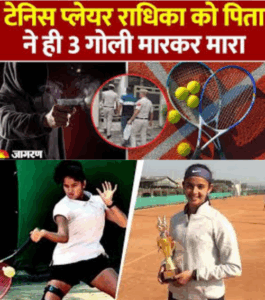
To the sports community, Radhika represented a new wave of ambitious, hardworking women pushing boundaries in disciplines still often dominated by men. Her death, especially under such circumstances, has left a deep void and raised urgent questions about the environment in which young athletes, especially women, are nurtured—or sometimes, suffocated.
The ongoing police investigation is attempting to unravel the full context behind this act of violence. As of now, authorities have confirmed that a case has been registered against the father under relevant sections of the Indian Penal Code. He remains in custody as the legal process moves forward. The police are also gathering testimonies from other family members, hoping to piece together a clearer picture of what may have led to this unimaginable act.
Speculation continues about the exact trigger behind the murder, and while some sources suggest it was a dispute over social media behavior, others believe that deeper family tensions may have been simmering beneath the surface for some time. In many Indian households, especially where traditional values are strongly upheld, daughters pursuing public careers or seeking independence—be it through sports, entertainment, or digital media—often find themselves caught between modern aspirations and rigid expectations. In Radhika’s case, if the reports are confirmed, her life was caught in this very crossfire.
What makes the situation more tragic is the lost potential. Radhika was at an age where her tennis career could have taken new heights. With the right support, she could have represented India on even bigger stages. Her participation in international events already indicated a growing recognition of her talent beyond national borders. The murder, therefore, is not just the loss of a daughter, a sibling, or a friend—it is the loss of a national asset, a future ambassador of Indian sport.
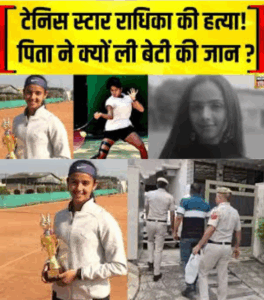
Public reaction to the incident has been one of profound shock and sadness. Many netizens, including celebrities and fellow athletes, took to social media to express their grief and disbelief. Hashtags like #JusticeForRadhika began trending within hours, with people demanding a thorough investigation and accountability for such a horrific crime. Some also used the opportunity to raise awareness about the psychological toll that athletes often face, particularly when familial support is lacking or turns toxic.
This incident also raises the broader issue of gun ownership and its regulation in India. While the revolver used in the crime was legally owned, its use in a domestic dispute with such fatal consequences has brought into focus the need for stricter evaluations of mental and emotional fitness for those holding firearms licenses. Questions are now being asked about how a disagreement—possibly over something as seemingly trivial as a social media post—could escalate into an irreversible tragedy with a licensed weapon.
Beyond the immediate legal proceedings, there is a collective mourning underway—for a young woman who dared to dream, who trained hard and traveled the world representing her country, only to be gunned down in her own home. Schools, tennis academies, and sports organizations across India have expressed condolences and called for a national discussion on how to better support the mental health and personal lives of athletes. Many are now advocating for counseling programs and conflict mediation mechanisms within families, particularly for those in high-pressure careers.
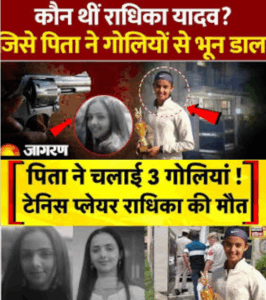
Radhika Yadav’s story, as devastating as it is, cannot be allowed to fade as just another news cycle. Her journey—from a small town to international tennis courts—was one of courage and determination. It is imperative that her death serves as a wake-up call to re-examine the support structures around India’s young athletes, the patriarchal dynamics that still limit women’s independence, and the urgent need to treat domestic violence, in all its forms, as a national priority.
The police investigation will continue, and the court proceedings will eventually deliver a verdict. But for Radhika Yadav, the sentence was already final—and undeserved. Her dreams were silenced by the very hands meant to protect her. In her memory, may India find the strength to protect its daughters better, to recognize the pressures they face, and to build a society where no dream is ever killed by fear, control, or violence.
Play video :
News
गरीब टीचर इलाज के बिना लौट रही थी… तभी डीएम ने व्हीलचेयर रोक दी — सच ने सबको सोचने पर मजबूर कर दिया
गरीब टीचर इलाज के बिना लौट रही थी… तभी डीएम ने व्हीलचेयर रोक दी — सच ने सबको सोचने पर…
अहंकार की वर्दी और स्वाभिमान का सैल्यूट: एक अनकही दास्तान
अहंकार की वर्दी और स्वाभिमान का सैल्यूट: एक अनकही दास्तान भाग 1: मधुपुर की गलियाँ और त्याग की नींव मधुपुर…
TEMİZLİKÇİ, PATRONUN ÇÖPÜNDE ŞÜPHELİ BİR ŞEY BULUR… VE HERKESİ KURTARIR!
TEMİZLİKÇİ, PATRONUN ÇÖPÜNDE ŞÜPHELİ BİR ŞEY BULUR… VE HERKESİ KURTARIR! . . . Temizlikçi, Patronun Çöpünde Şüpheli Bir Şey Bulur……
Mafya Patronunun Bebeği Dokunulduğunda Durmadan Ağlıyordu — Ta ki Bir Hemşire Akıl almaz Olanı Yapan
Mafya Patronunun Bebeği Dokunulduğunda Durmadan Ağlıyordu — Ta ki Bir Hemşire Akıl almaz Olanı Yapan . Mafya Patronunun Bebeği Dokunulduğunda…
Harp Okulu Skandalı Sınırdaki Yolsuzluk Çetesini Kadın General Bitirdi
Harp Okulu Skandalı Sınırdaki Yolsuzluk Çetesini Kadın General Bitirdi . . . Harp Okulu Skandalı: Sınırdaki Yolsuzluk Çetesini Bitiren Kadın…
Mart 1982’de Ankara’da bir aile iz bırakmadan kayboldu. 25 yıl sonra bulunan günlük her şeyi değişti
Mart 1982’de Ankara’da bir aile iz bırakmadan kayboldu. 25 yıl sonra bulunan günlük her şeyi değişti . . . Mart…
End of content
No more pages to load

